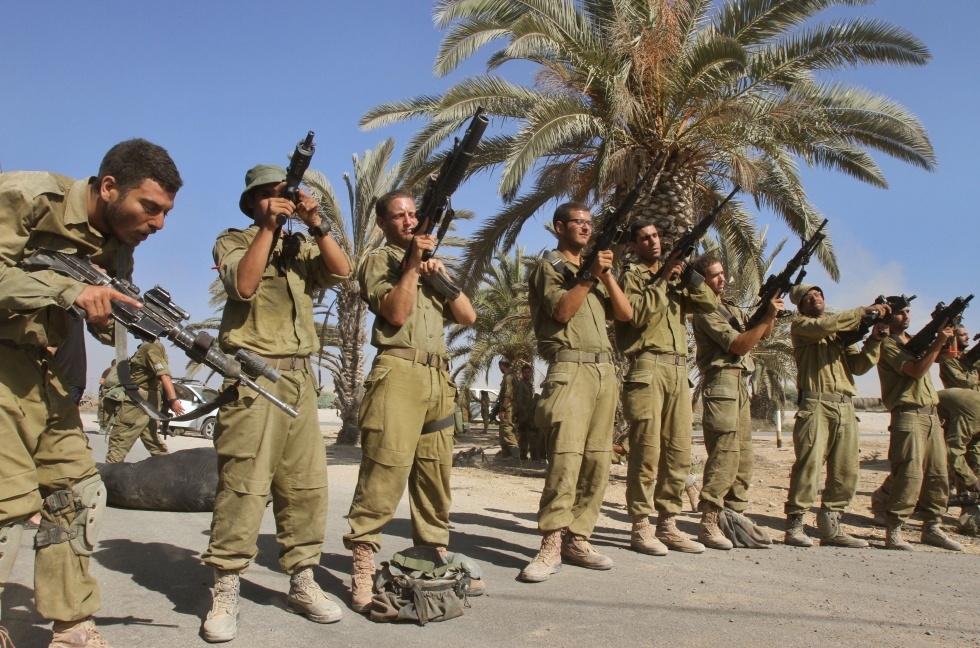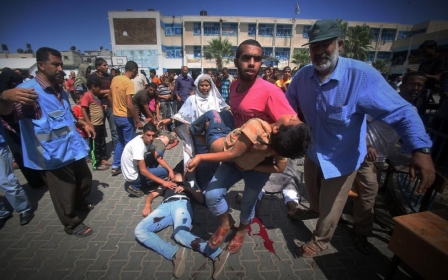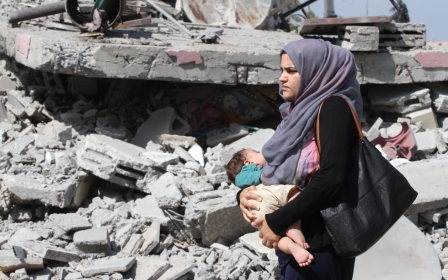Israel shuns Gaza truce calls amid world outrage

Israel will not stop its military campaign in Gaza until long-term calm is restored, Prime Minister Benjamin Netanyahu said Monday, shunning increasingly vocal world demands for a truce.
"The campaign in Gaza is continuing," he said at the end of a seven-hour humanitarian lull which saw violence subside in the battered Palestinian enclave.
"This operation will only end when quiet and security is established for the citizens of Israel for a prolonged period," he said on a visit to the army's southern command.
The Israeli operation in Gaza began on July 8 with an air campaign and expanded into a ground operation on July 17.
"What is about to conclude is the IDF (army's) action to deal with the tunnels," Netanyahu said, without elaborating.
At the weekend, Netanyahu said troops would finish with the tunnels before moving into a new phase, although officials have not said what it would involve.
The Israeli army confirmed it had begun pulling out some troops from Gaza during the weekend in what was largely understood to be the beginnings of a unilateral withdrawal which would not involve any negotiated agreement with Hamas.
The Israeli army said on Monday it was resuming its strikes on the Gaza Strip, after the end of a seven-hour humanitarian lull.
"We are resuming our operations, including air strikes," spokesman Lieutenant Colonel Peter Lerner told AFP.
He said troops were redeploying within Gaza while other forces were pulling out in a process which began on Saturday.
Israel faces growing international condemnation
Israel faced growing international condemnation as its operation in Gaza entered its 28th day, leaving more than 1,800 mainly-civilian Palestinians dead.
France led the charge, after the strike on a school sheltering civilians Sunday left 10 people dead and sparked widespread outrage.
"When I see what is happening with the Christians in Iraq, the minorities in Syria, massacres every day. What is happening too in Gaza, massacres ... We have to act," President Francois Hollande said.
"Europe must be ready ... to take the initiative on the international scene and not think simply that others will do the job for them," he said.
Foreign Minister Laurent Fabius issued one of the most strongly worded condemnations yet from a Western official.
"How many more deaths will it take to stop... the carnage in Gaza?" Fabius said in a statement.
"Israel's right to security is total, but this right does not justify the killing of children and the slaughter of civilians," Fabius said.
"A political solution is essential... and should in my opinion be imposed by the international community," he said.
The strong words from France prompted some to praise Western officials for at last taking a tougher line with Israel.
"Finally! This is very, very good. The systematic targeting of civilians and schools must be denounced," said Yves Aubin de la Messuziere, a retired French diplomat and expert on the Middle East.
"We should be brave enough to point the finger of blame, of course at Hamas but also at Israel," he said.
The United Nations condemned Sunday's strike at the school, where around 3,000 homeless Palestinians had been sheltering, with Secretary General Ban Ki-moon calling the attack "a moral outrage and a criminal act".
US 'appalled' by Israeli strikes
US State Department spokeswoman Jen Psaki said Washington was also "appalled", demanding a "full and prompt" investigation into the strike -- the third time in 10 days a UN school had been hit in the fighting.
Spain roundly criticised the strike, with the foreign ministry in a statement calling it a "very serious" attack.
"Spain reiterates its urgent call for strict respect of international humanitarian law and in particular the obligation to avoid hurting the civilian population as well as to respect the inviolability of UN sites," it added.
"Israel's armed forces should intensify their efforts to avoid the loss of innocent lives."
British Prime Minister David Cameron said the United Nations was "right" to condemn the shelling.
"The UN has spoken very clearly and I think they're right to speak very clearly," Cameron told the BBC.
"International law is clear that it's completely wrong and illegal to target civilians, if that's what's happened."
The British government said on Monday it was "urgently" investigating media reports that a British aid worker has been killed in Gaza.
"We are aware of the reports of the death of a British national in Rafah and are urgently looking into them," a spokesman for the Foreign Office said.
Russia said Monday it had called on Israel to agree to a humanitarian ceasefire in Gaza, in a phone call between the foreign ministers of the two countries.
Foreign Minister Sergei Lavrov also told his Israeli counterpart Avigdor Lieberman that the foes "should reach an agreement that excludes the return to violence in which mostly innocent civilians suffer".
The Russian foreign ministry statement did not mention whether Lavrov had brought up the Palestinian casualties suffered during three attacks on UN-operated schools and refugee centres in Gaza.
Moscow supported the Palestinian cause in the Soviet era but established warmer ties with Israel in the past two decades.
New MEE newsletter: Jerusalem Dispatch
Sign up to get the latest insights and analysis on Israel-Palestine, alongside Turkey Unpacked and other MEE newsletters
Middle East Eye delivers independent and unrivalled coverage and analysis of the Middle East, North Africa and beyond. To learn more about republishing this content and the associated fees, please fill out this form. More about MEE can be found here.



